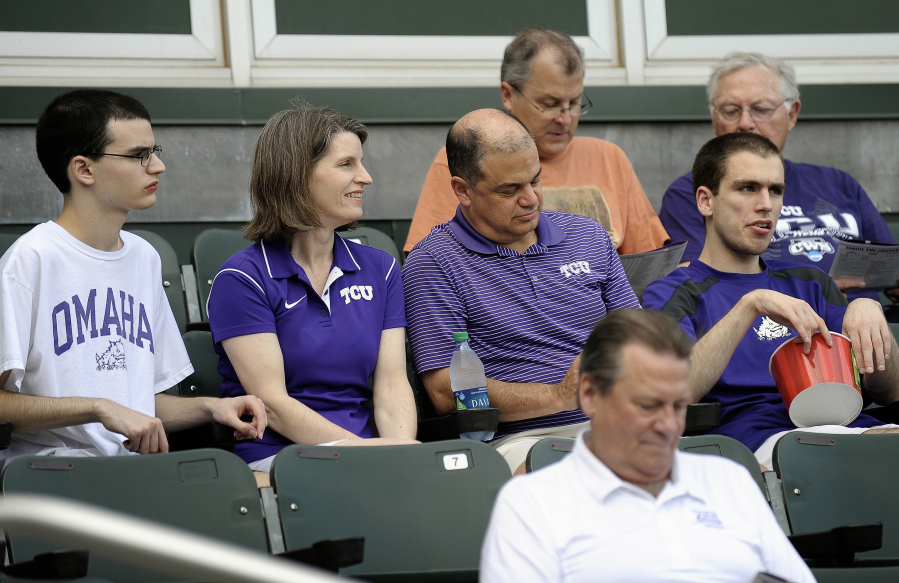FORT WORTH, Texas — Another school year and football season are days away, but Mark and Sarah Cohen would probably rather be at Albertsons.
That’s where they can watch their son.
He’ll bag groceries, load them into a customer’s car, push carts back inside the store and do anything else he can do to help during the course of his shift. It’s perfectly routine for thousands of teenagers, but not for Steven Cohen.
He and his brother Adam, 22, are autistic, Adam more severely.
They’ve grown up either at home with family or at school all of their lives. They were never left to themselves.
So when Steven, 18, scheduled to graduate next year from North Crowley High School, got a job at the neighborhood grocery store in June, it was hard to imagine a more profound feeling for his parents.
“As proud a moment as I’ve had in life,” said his father, Mark, associate athletics director for athletics communications at Texas Christian University.
His mother, Sarah, works part time as a data control specialist in the TCU admissions office. Steven’s job meant structure for his life post-school, which provides peace of mind for her as she and her husband look for the same for Adam, nonverbal in his communication.
There is not much time.
The academic and athletic calendar at TCU began Aug. 21. Another full year of work duties will soon be upon the Cohens.
“We have always talked about what the boys will do when they are finished with school,” Sarah said.
That time arrived sooner than anyone can believe.
• OLD ROUTINES.
For years, the Cohen family had a routine. Everyone would get up, Steven would help his older brother Adam get dressed and ready for school, the family — which includes oldest brother David — would have breakfast, and everyone would be out the door.
After school, the routines continued. Steven would prepare the food he knows he and Adam like. David, who graduated from TCU two years ago, would be on his homework and helping his younger brothers with theirs. Everyone helped mom with chores, Adam would sit with his iPad watching Disney movies — often, the same scene over and over — then dad would be home for the night-time routines.
If necessary, neighborhood friends or TCU students would help watch Steven and Adam if work duties or other obligations pulled Mark and Sarah away.
It’s routine for many families.
But for the Cohens, the routine was never routine, and the extra help Steven and Adam required was always present. Adam was frequently prone to outbursts, in public or at home, and learning to anticipate, prevent and manage them was a constant part of life.
“Even though I claimed I understood, it still drove me nuts when I was little,” David said. “Why can’t Adam do this? Why can’t Steven learn this? When you get older, you get the full idea. I remember my parents always told me, growing up with this, it’s going to make you so much stronger. And yeah, my patience is through the roof right now.”
The advocacy organization Autism Speaks defines the condition as a developmental brain disorder caused by gene or environmental influences. The disorders result in varying degrees of communication difficulty, unusual behavior and social skills and repetitive behavior.
The Centers for Disease Control estimates one in 68 children aged 8 are identified as autistic.
• NEW ROUTINES.
When David moved away, routines changed. He is in his second year as director of communications for the athletic department at Southern Miss, following in his father’s footsteps.
Now Adam, at 22, has “aged out” of the special education program at Crowley and has no more school waiting for him in the fall.
His father is trying to find a job or vocation for him, too. It will be more difficult with Adam’s nonverbal form autism and outbursts, although they have become rare.
“In the past, if a child was screaming, that would throw him off,” Mark said. “Not anymore. We used to take headphones everywhere we went for him. As soon as we walked out of the house, Steven would always say, ‘Do we have the headphones?’ Because that was the routine, to bring the headphones for Adam. And now we don’t even need the headphones. Sarah took him to TCU football games last year for the first time. It’s just progress that he’s made.”
Still, the family is wary of the unexpected. Last month, their home lost power unexpectedly, and the loss of Wi-Fi interrupted Adam’s routine with his iPad and Disney movies.
“He was thrown for a loop,” Mark said. “Sarah told me he had some outbursts and was crying. Big tears.”
Steven, higher functioning on the autism spectrum, has always helped his older brother with his daily routines.
“Steven knows exactly what Adam needs, what Adam wants, Adam’s schedule,” Mark said. “Here’s an autistic 18-year-old who takes care of his 22-year-old autistic brother.”
As a child, Steven showed a knack for helping his mother at the grocery store. He’d even stop to straighten out shelves. Last year, he entered the store on his own and completed a short grocery list for his father.
Now he’s got a checking account.
“He gets paid every week, and every couple of weeks, we’ll go to Barnes and Nobles — he loves Barnes and Nobles — and he’ll look at me and I’ll say, ‘It’s your money, you earned it, get what you want,’ ” Mark said. “He still loves Thomas the Tank Engine trains. We probably have 150 of them at the house. He’ll pick up a train or a little book or some music — the other day he got the soundtrack to ‘Cars 3’ — and he’s got his debit card, he knows the chip, and punches in the four-digit code.”




